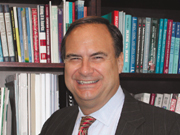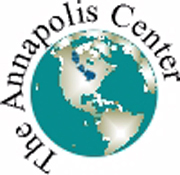Richard Seibert,
The Annapolis Center for
Science-Based Public Policy
By Tom Roskelly
At a recent
business breakfast, Richard Seibert, chief operating officer of
The Annapolis Center for Science-Based Public Policy, was explaining
the concept of risk in a talk entitled "Are We Scaring Ourselves
to Death?"
 "It's 8 a.m., you tell your kids to hurry and brush their teeth---with
fluoride toothpaste, of course. They've just finished eating the
breakfast granola that you made from scratch because the store-bought
version has too many additives, even though it's less expensive.
Your kids use the milk you purchased at the health food store
because the cows that produce it were not injected with bovine
growth hormones. The non-BGH milk is twice as expensive, but your
kids are worth it. You pack lunches with no apples or other fruit---pesticides,
you know---just peanut butter and jelly on wheat bread. But you're
still concerned because you heard a news report that peanut butter
can cause cancer.
"It's 8 a.m., you tell your kids to hurry and brush their teeth---with
fluoride toothpaste, of course. They've just finished eating the
breakfast granola that you made from scratch because the store-bought
version has too many additives, even though it's less expensive.
Your kids use the milk you purchased at the health food store
because the cows that produce it were not injected with bovine
growth hormones. The non-BGH milk is twice as expensive, but your
kids are worth it. You pack lunches with no apples or other fruit---pesticides,
you know---just peanut butter and jelly on wheat bread. But you're
still concerned because you heard a news report that peanut butter
can cause cancer.
 As you drive to school, you notice it's a beautiful, sunny day.
You wish you'd put on the kids' sun block. According to a radio
report about the ozone layer, just being outside in the sun is
enough to cause skin cancer. You think about bringing sun block
to school later, but you hate to drive so much because all the
pollution from car exhaust is killing the atmosphere. Besides,
the American Lung Association tells you that air pollution causes
asthma, which is increasing at alarming rates. Your cell phone
rings. You're expecting an important call, but you dare not answer
because cell phones and driving do not mix. Besides, you just
heard about a guy in New Jersey who is suing because he says his
cell phone caused a brain tumor." And so it goes!
As you drive to school, you notice it's a beautiful, sunny day.
You wish you'd put on the kids' sun block. According to a radio
report about the ozone layer, just being outside in the sun is
enough to cause skin cancer. You think about bringing sun block
to school later, but you hate to drive so much because all the
pollution from car exhaust is killing the atmosphere. Besides,
the American Lung Association tells you that air pollution causes
asthma, which is increasing at alarming rates. Your cell phone
rings. You're expecting an important call, but you dare not answer
because cell phones and driving do not mix. Besides, you just
heard about a guy in New Jersey who is suing because he says his
cell phone caused a brain tumor." And so it goes!
Dick explains The Center is a national think tank located right
here in Annapolis. Founded 10 years ago as an independent nonprofit
organization, it works to support and promote legislation and
regulations based on sound science. It's recognized as a credible
voice in the decision-making process, providing non-partisan information
on the current state of science. For example, The Annapolis Center's
report entitled "Cost-Benefit Analysis in Environmental, Health
and Safety Regulation" was used as the basis for legislation to
advance certain regulatory reforms. The Center's work is inherently
independent and free from speculation of relationships with stakeholders
and funders, in that the consensus documents are generated, prepared
and reviewed by internationally acclaimed scientists and economists
selected from academia and government who are neither spokespersons
for industry nor advocacy groups.
Another recent report entitled "Asthma: Separating Facts From
Fiction" has received favorable critical review and, to date,
has appeared in 388 newspapers across America with a combined
readership of more than 15 million. This report reiterates how
asthma is a serious public health problem, a chronic illness that
has been increasing in prevalence in the United States by almost
74 percent since 1980, but remains a paradox. Dick reminds us,
"...there is no good or standard definition of the disease, nor
do we really know what causes it." Air pollution is frequently
cited as a cause of asthma. However, countries with "clean" air,
like New Zealand, have a high prevalence of asthma, while countries
with "dirty" air like Mexico have a lower prevalence. In this
country, statistics show that air pollution has decreased dramatically
over the last three decades, while instances of asthma have increased.
While we don't really know much about the causes of asthma, we
do know how to treat it.
From the Center's perspective, asthma represents a medical management
failure---something Dick knows about first hand. His daughter
may have developed asthma. He says "maybe" because she has never
been physician-diagnosed. She played soccer last year on a county
youth team. Her coaches never asked players if they had asthma
and, therefore, didn't know if asthmatics had proper medication
at games. Running late for a game, Dick's daughter forgot her
inhaler and, wouldn't you know, developed an apparent asthma attack.
The family made an emergency trip to a health-care facility which
turned out to be unnecessary. The fact is, most asthmatics and
parents of asthmatics don't take the disease as seriously as they
should. If they did, we could dramatically reduce the nearly 5
million hospital admissions and thousands of deaths due to the
disease each year. But, Dick says, "Instead of focusing on how
to treat the disease, the focus seems to be on using the disease
for fund-raising or political purposes."
Because of the importance of this issue, The Annapolis Center
is attempting to raise funds to develop CDs and videos on asthma
management to share with school nurses, school coaches and recreation
program coaches, such as Little League baseball, youth football
and soccer.
Earlier this year, The Annapolis Center sponsored a Washington,
D.C., bio-terrorism conference in conjunction with the U.S. Medicine
Institute for Health Studies. This was an interactive forum for
invited policy-makers in government and industry on the topic
of disease surveillance, bio-terrorism and homeland security,
certainly a timely topic in a post 9/11 world. This conference
was moderated by The Annapolis Center's chairman of the board
and president, retired Vice Adm. Harold M. Koenig, USN. Dr. Koenig,
a resident of San Diego, Calif., is the former Surgeon General
of the United States Navy and a frequent visitor to Annapolis
and Washington, D.C.
His assessment, especially after Sept. 11, is that it's time to
stop taking action based on TV news-driven emotional responses
and begin to formulate them based on rational thinking. As the
Science Advisory Board recommended to the U.S. Environmental Protection
Agency, we need to first analyze the risk posed by a potential
hazard, compare that risk to the potential risks of other hazards,
and finally prioritize the hazards based on which pose the most
risk, just the sort of thing The Annapolis Center has been doing
for a decade. By supporting and promoting responsible energy,
environmental, health and safety decision-making through evaluation
of risk and cost-benefit analysis, The Annapolis Center is having
an impact on "quality of life" throughout the world. Not bad for
little old Annapolis.
Back
|

